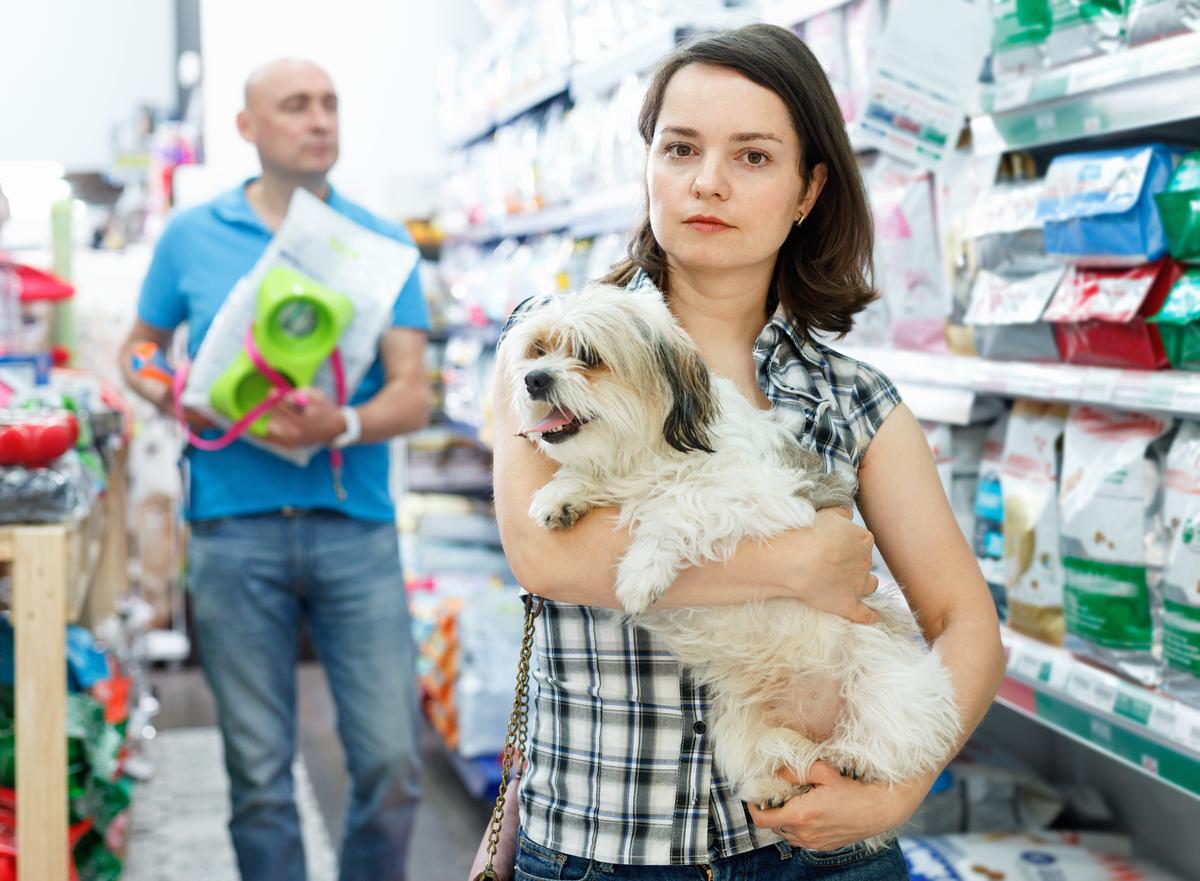Bringing our furry companions along with us on various outings has become increasingly common. Dogs, in particular, are often considered part of the family and are cherished companions. As dog owners, we naturally want to include them in our daily activities, including trips to stores. However, before taking our dogs along on shopping excursions, it's essential to understand the guidelines, benefits, and considerations involved.
Here, we will explore the topic of taking dogs to stores. We will delve into the benefits it can offer, factors to consider when making that decision, alternative options for dog owners, and some frequently asked questions regarding this topic. Whether you're a seasoned dog owner or contemplating taking your furry friend to a store for the first time, this article provides valuable insights and practical information to ensure a positive experience for you and your beloved pet.
So, let's dive in and discover the wonderful world of taking dogs to stores.

Benefits of Taking Dogs to Stores
Taking your dog to stores can offer several benefits for both you and your furry friend. Here are some advantages of including your dog in your shopping experiences:
Socialization Opportunities: Bringing your dog to stores provides valuable socialization opportunities. Dogs are social animals, and exposing them to new environments, people, and other animals can help them become more comfortable and well-adjusted. Interacting with store employees, fellow shoppers, and even other dogs in a controlled environment can contribute to their social development and improve their overall behavior.
Bonding Time: Taking your dog to stores allows for quality bonding time. Dogs are pack animals and enjoy being part of their human family's activities. Including them in your shopping outings strengthens your bond, as they get to spend time with you in different settings. It provides a shared experience and shows your dog that they are a significant member of your family.
Mental Stimulation: Stores offer a variety of sights, sounds, and smells that can mentally stimulate your dog. Walking through aisles, encountering different scents, and observing new surroundings can engage their senses and provide mental enrichment. It helps prevent boredom and can be an alternative to the usual walks or playtime routines.
Environmental Familiarity: Taking your dog to stores exposes them to various environments, which can help them become more adaptable and confident in different settings. It familiarizes them with the sights, sounds, and routines of public spaces, making future outings more comfortable and less stressful. This can be particularly beneficial if you plan to travel with your dog or visit other public areas frequently.
Exercise and Training Opportunities: Stores often require some walking, providing an opportunity for your dog to get exercise during your shopping trips. It helps fulfill their physical activity needs and promotes a healthy lifestyle. Additionally, taking your dog to stores can serve as a training exercise, allowing them to practice their obedience skills, leash manners, and impulse control in real-world scenarios.

Positive Experiences and Enjoyment: For many dogs, going to stores can be an exciting and enjoyable experience. They get to explore new environments, encounter friendly people, and sometimes receive attention or treats from store employees. It can be a positive outing for your dog, contributing to their overall well-being and happiness.
Taking your dog to stores offers numerous benefits, including socialization, bonding, mental stimulation, environmental familiarity, exercise, training opportunities, and positive experiences. However, it's crucial to consider store policies, your dog's temperament, and the comfort of others when deciding to bring your furry friend along.
Factors to Consider When Taking Dogs to Stores
Before taking your dog to a store, it's essential to consider a few factors to ensure a positive experience for everyone involved. Here are some key factors to keep in mind:
Store Policies and Guidelines: Different stores have varying policies regarding dogs. Some stores may have a welcoming attitude toward dogs and openly allow them inside, while others may have specific guidelines or restrictions. It's essential to check the store's rules beforehand to avoid any issues or potential conflicts. You can usually find this information on the store's website or by contacting their customer service. Knowing the store's policy will help you determine if it's suitable for bringing your dog along.
Dog's Temperament and Training: A well-behaved and obedient dog is more likely to be welcomed in stores. Before deciding to take your dog shopping, assess their temperament, social skills, and level of training. Consider how your dog typically behaves in public settings and around strangers. If your dog becomes anxious, aggressive, or overly excited in new environments, it may be best to refrain from taking them to stores. Training your dog to follow basic commands and behave appropriately in public places is essential for a positive experience.
Safety and Health Precautions: Ensure that your dog is up to date with vaccinations and parasite prevention. This not only protects your dog's health but also ensures the safety of other animals and people in the store. Keep your dog on a leash or in a carrier to maintain control and prevent any accidents or incidents. Some stores may require dogs to be on a leash at all times. Additionally, consider the store's environment and potential hazards for your dog. Watch out for small objects, toxic substances, or fragile items that your dog could accidentally knock over or ingest.
Consideration for Others: While you may love your dog and enjoy their company, it's critical to be considerate of others in the store. Not everyone is comfortable around dogs or may have allergies or fears. Keep your dog close to you, avoid allowing them to approach other shoppers without their consent, and always clean up after your dog if they have an accident. Being a responsible dog owner means being mindful of the comfort and safety of those around you.
By considering these factors, you can make an informed decision about whether it's appropriate to take your dog to a store. Remember, not all stores are dog-friendly, and even those that allow dogs may have specific rules you need to follow. Your dog's well-being, the store's policy, and the comfort of others should always be prioritized when deciding to bring your furry friend along for a shopping trip.
Popular Stores That Allow Dogs
While policies can vary, here are some popular types of stores that generally allow dogs:
Pet-Friendly Retail Chains: Several retail chains are known for being dog-friendly. These stores often provide water bowls, dog treats, and even designated dog-friendly areas within their premises.
Grocery Stores: Some grocery stores allow dogs, especially if they have a pet-friendly policy. However, it's necessary to keep your dog on a leash and be mindful of any potential food hazards or allergies.
Home Improvement Stores: Certain home improvement stores allow well-behaved dogs, recognizing that their owners might need to shop with their pets. These stores often have wider aisles and more spacious areas for dogs to walk around.

Outdoor Retailers: Outdoor retailers such as pet supply stores or gardening centers are generally more welcoming toward dogs. These stores understand that their target customers often have furry companions and create a pet-friendly environment.
Tips for Taking Your Dog to Stores
To ensure a pleasant experience for both you and your dog when going shopping, consider the following tips:
Preparing Your Dog: Before heading to the store, make sure your dog has had proper exercise and bathroom breaks. Bring along their favorite puzzle toys or treats to help keep them calm and focused.
Ensuring Good Behavior: Train your dog to follow basic commands and behave appropriately in public places. Positive reinforcement behavior and consider using a leash or harness that provides control while allowing freedom of movement.
Bringing Essential Supplies: Carry essential supplies like poop bags, water, and a portable water bowl for your dog. Consider bringing a comfortable mat or blanket to provide a designated space for them to rest if needed.
Alternatives for Dog Owners
If taking your dog to stores isn't feasible or preferred, there are alternative options for dog owners to consider:
Dog-Friendly Cafes and Restaurants: Many cafes and restaurants in the United States have embraced a dog-friendly atmosphere, allowing patrons to bring their four-legged friends along. These establishments often provide outdoor seating areas where dogs are welcome. It's a wonderful way to enjoy a meal or a cup of coffee while keeping your furry companion by your side. Some cafes even offer special dog menus or treats, ensuring that your dog feels just as welcome as you do.
Dog Parks and Pet-Friendly Spaces: Dog parks and pet-friendly spaces are excellent alternatives for dog owners looking to provide their furry friends with socialization and exercise opportunities. These designated areas offer a safe environment where dogs can run, play, and interact with other dogs. Many cities and communities across the United States have dedicated dog parks with fenced areas, water stations, and agility equipment. It's a great way to let your dog burn off some energy and make new canine friends.
Pet-Friendly Stores: While not all stores allow dogs, there are specific pet-friendly stores where dogs are welcomed with open arms. These stores are designed to cater to pet owners and provide a shopping experience that includes your furry companion. From pet supply stores to boutique pet shops, these establishments understand the importance of including your dog in the shopping process. They often offer a wide range of pet products, toys, and treats, allowing you to browse while your dog happily explores the store.
Outdoor Farmers' Markets: Farmers' markets have become increasingly pet-friendly, especially those held in outdoor spaces. These markets often feature local vendors selling fresh produce, artisanal products, and unique crafts. Bringing your dog to a farmers' market allows them to enjoy the sights, sounds, and smells of a bustling community gathering. It's important to keep your dog on a leash and be mindful of other marketgoers, but it can be a delightful experience for both you and your furry friend.

Hiking Trails and Nature Parks: For dog owners who enjoy outdoor activities, hiking trails, and nature parks offer the perfect alternative. Many trails and parks in the United States welcome dogs, allowing them to accompany you on your outdoor adventures. Whether it's a leisurely stroll through a park or a challenging hike up a mountain, being in nature provides dogs with an opportunity to explore, exercise, and engage their senses. Just make sure to research the specific park's regulations regarding dogs, such as leash requirements or any restricted areas.
These alternatives offer dog owners various opportunities to spend quality time with their pets while enjoying different experiences. Whether it's sipping coffee at a dog-friendly cafe, playing fetch at a dog park, or exploring nature together, these options ensure that dogs remain an integral part of your activities outside of stores.
Conclusion
Taking your dog to stores can be a rewarding and enjoyable experience for both you and your furry friend. It offers an opportunity for companionship, socialization, and even a little exercise. However, it's crucial to consider various factors before bringing your dog along.
First and foremost, familiarize yourself with the store's policies and guidelines regarding dogs. Not all stores allow dogs, and even those that do may have specific rules you need to adhere to. Checking the store's website or contacting their customer service will provide you with the necessary information.
Next, assess your dog's temperament, social skills, and training. Well-behaved and obedient dogs are more likely to be welcomed in stores. If your dog becomes anxious or exhibits aggressive behavior in public settings, it may be best to explore alternative options for their well-being.
Ensure your dog's safety and health by keeping them up to date with vaccinations and parasite prevention. Keep them on a leash or in a carrier to maintain control and prevent accidents. Being mindful of potential hazards in the store and the comfort of other shoppers is also required.
If taking your dog to stores isn't feasible or preferred, consider alternative options that cater to dog owners. Dog-friendly cafes and restaurants provide an opportunity to enjoy a meal or a cup of coffee with your furry companion. Dog parks and pet-friendly spaces offer socialization and exercise opportunities. Pet-friendly stores and outdoor farmers' markets are other options worth exploring. Additionally, hiking trails and nature parks allow you to enjoy the outdoors together.
Always be considerate of others in the store and prioritize the well-being of your dog, the store's policies, and the comfort of fellow shoppers. Responsible dog ownership involves making informed decisions and ensuring a positive experience for everyone involved.
So, the next time you're thinking about bringing your dog to a store, consider these factors and make the best choice for you and your furry friend.
FAQs
Here are some frequently asked questions about taking dogs to stores:
1. Q: Can I take my dog to any store?
A: Not all stores allow dogs. It's essential to check each store's policy before bringing your dog along.
2. Q: Are there specific rules for taking dogs to stores?
A: Yes, each store may have different rules and guidelines regarding dogs. Some stores require dogs to be on a leash, while others may have size restrictions or require proof of vaccinations.
3. Q: How do I know if a store is dog-friendly?
A: You can check a store's website or call ahead to inquire about their pet policy. Additionally, signs or stickers near the entrance might indicate if dogs are allowed.
4. Q: What should I do if my dog misbehaves in a store?
A: If your dog misbehaves, it's important to address the behavior immediately. Use positive reinforcement and redirect their attention. If necessary, consider seeking professional training assistance.
5. Q: Can I bring my canine into a store in a carrier or dog stroller?
A: Some stores may allow canines in carriers or strollers. However, it's best to verify the store's policy beforehand to avoid any misunderstandings.






